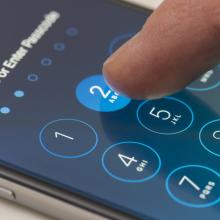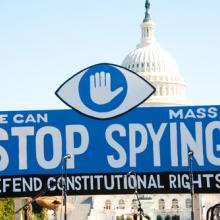NSA

Image via ymgerman/Shutterstock.com
There are two things that make this order very dangerous, Opsahl said. The first is the question it raises about who can make this type of demand. If the U.S. government can force Apple to do this, why can't the Chinese or Russian governments? The second is that while the government is requesting a program to allow it to break into this one, specific iPhone, once the program is created it will essentially be a master key.
1. I Went to Church with Bruce Jenner, and Here’s What Caitlyn Taught Me About Jesus
“Caitlyn knows who Jesus is, and Jesus knows her by name. Whether that sits comfortably on a timeline or blog comment, I know firsthand that Caitlyn has heard the good news. And, Caitlyn has taught me more about Jesus.”
2. And the Award for Trailblazing Feminist Icon Goes to — Miss Piggy
The Sackler Center for Feminist Art awarded the Muppet with its First Award, which recognizes women for being first in their fields and has included the likes of Sandra Day O’Connor, because the character has “qualities that … women need to have to face the world as it is, and she gives us a good smile on top of it all.”
3. In Baltimore Schools, Free Meals for All
"Given the socio-economic status of the city, it's a no-brainer," [parent David T.] Clements said of the program. "Parents can now take that money and apply it to their futures."
4. Study Finds Global Warming Hasn’t Slowed
The latest study, published in Science, reverses previously held thought that global warming was on hiatus. Not so, according to the numbers, which were based on what the scientists say is more accurate land and sea temperature measurements.
The Senate debate period on the Patriot Act ran past midnight Sunday night, effectively allowing three provisions of the controversial act to expire. Despite warnings of national security risks, "it is clear that the lapse will not come close to debilitating counterterrorism efforts," according to CNN.
The NSA's bulk data collection program was one of the provisions to expire, officially shutting down by 8 p.m. Sunday night.
The Senate is expected to restore some form of these provisions by midweek.
1. We’ve Been Here Before: Charges Don’t Guarantee Conviction
"Before we get carried away with a sense of justice delivered, let us remind ourselves of some high-profile cases in which criminal prosecutions did not deliver findings of guilt."
2. ‘If My Shorts Make You Uncomfortable, You Are the Problem.’
A high schooler reminds everyone why she’s about to start wearing shorts. Hint: staying cool in record temperatures.
In 1990, my father and pregnant mother packed up their life in suburban Illinois, bundled their four young children (including me) onto a plane, and landed in Romania to teach on a grant at the University of Bucharest.
The country was in the throes of revolution following the execution of ousted dictator Nicolae Ceaușescu, and the transfer of power was by no means tidy or complete. The Securitate — one of the most brutal secret police forces in the world — proved difficult to shut down. All our neighbors operated under the assumption that their every move continued to be watched (one friend had taken apart his typewriter by hand and hid it so he could answer honestly that he did not keep a typewriter in the house). Being American, my parents were told to expect our apartment to be bugged.
Freedom had come, but the systems of omnipresent control proved psychologically hard to shake.
The specter of surveillance is an insidious tool. In the 1790s, British philosoper Jeremy Bentham developed a centralized prison model called the panopticon, in which every occupant is visible to a single guard. Most models, since adapted by prisons and schools around the world, leave open the possibility that there is no supervisor watching after all. Whether there is isn't the point — the mere promise of one is enough to coerce significant behavior change. Being constantly observable is the trap.
These days, Americans don’t need a formative year spent in post-soviet Romania to feel uneasy about omnipresent surveillance. Edward Snowden’s revelations of massive secret surveillance programs operating under the NSA, with enormous access to private data from citizens not suspected of terrorism or criminal wrongdoing, rocked our understandings of data privacy and civil liberty. Now, as then, it’s reasonable to worry that we’re being watched.
While Angry Birds has produced a massive monetary windfall over the past few years, the game has endured a significant level of controversy, especially in recent months. In January it was revealed that Angry Birds was a “leaky application,” as it was used by the National Security Agency and Government Communications Headquarters to collect private data about its users, such as residential location and sexual orientation. According to numerous online and print media investigative publications, the private user information of Angry Birds users was leaked through the application itself and collected by government authorities and private retailers for detailed analysis (under the stated purpose of research and national security). In the midst of it all, the incriminating evidence revealed that Angry Birds was a massive privacy hazard, as the Rovio Entertainment application allows the intimate details of its user identities to be stolen and even sold.
I was encouraged by the findings of U.S. District Court Judge Richard Leon on Monday who granted an injunction to plaintiffs Larry Klayman and Charles Strange that will temporarily stop the National Security Agency from continuing their data-gathering program that mines information from our mobile phone calls.
The injunction was issued because the judge believes that Klayman and Strange likely will win their lawsuit against the federal government, claiming that the phone record collection practice is an unconstitutional violation of personal privacy.
The whole storyline is made that much more dramatic since the otherwise secret program was leaked to the public by former NSA contract Edward Snowden, who is now on the run, seeking asylum in exchange for shared intelligence. And while some perceive Snowden as a hero of individual liberty, others vilify him as an enemy of the United States, much like any other terrorist. Interestingly, people’s opinions about the NSA — and, frankly, the Obama administration and the government as a whole — diverge in similar ways.
Fear sold the National Security Agency’s phenomenally intrusive program of spying on everyone and everything, but fear doesn’t explain it.
A nation reeling from terrorist attacks, the thinking went, would excuse the NSA’s vast eavesdropping on Americans and non-Americans, even friendly heads of state.
The reason for doing so, however, probably lay in something more mundane, more like the all-night party outside our apartment window last weekend.
Young men and women stood on a patio facing the courtyard of our U-shaped apartment building. They drank, and they talked. They drank more, and their talking turned to shouting.
By 4 a.m., their shouting and chugging were out of control. Who was going to stop them? No neighbor would dare knock on a door to confront drunks.
This was self-centeredness run amok. It was complete unawareness of consequences, complete disregard for the rights of others. An essential freedom to act had become a license to violate.
Sound familiar?
ROME — A spokeswoman for the National Security Agency denied reports from a leading Italian news magazine that U.S. spies may have listened in on conversations from inside the Vatican leading up to the March conclave that elected Pope Francis.
The newsweekly Panorama had reported in its Oct. 31 editions that the NSA tapped phones in the Santa Marta guesthouse where cardinals stayed before the conclave, as well as the cell phones of several cardinals, including Jorge Bergoglio, who became Pope Francis. The Panorama article did not identify its sources.
As if it wasn’t chilling enough to learn that NSA cronies are poring over your web browser history, now we discover that Barack Obama sits in bed at night and listens in on German Chancellor Angela Merkel’s cell phone calls to Domino’s.
Okay, maybe those are a bit of a stretch, but quite a buzz has been generated as of late about the revelation that the United States does, indeed, monitor the communications of leaders from allied nations, including the cell phone activity of Chancellor Merkel. For some, the collective reaction has been more of a collective shrug, as if such impositions should be expected from a global superpower that generally prefers to maintain that status. But for others, there’s a clear sense of shock and outrage.
For starters, let's clarify: nations cannot be friends.
SINCE WE NOW know the federal government has been monitoring our every move for years—recording our telephone calls, reading our emails, trying to friend us on Facebook (“you have 295,984,457 mutual friends!”)—I wanted to clarify a few personal remarks that may have been misconstrued by NSA computers; computers which, I might add, are doing a heckuva job.
When I emailed a friend that I thought I “killed” at a recent gathering, I meant that I was particularly amusing that evening. I was not bragging about some heinous crime, which I would never commit anyway because, frankly, that’s not where the laughs are.
But “killed” looks bad in cyberspace, even though it’s something comedians want to do, as opposed to “bombed,” which is the opposite of “killed,” although NSA computers probably recognize a certain similarity between the two and automatically alert law enforcement officials. But again, the word “bombed” is a comedy concept meaning, variously, “wishing you were dead as an audience sits silently in judgment,” or for me, who entertains mainly in the homes of friends, “wishing you were dead, because people are laughing about you in the kitchen.”
But living in a free society means we shouldn’t have to watch what we say to avoid the unwanted curiosity of federal authorities. Heck, I get into enough trouble just trying to cheer up taciturn gatherings. (“Hey, is this a party or a funeral, hah hah?! What? Oh, sorry, I didn’t notice the flowers. Yes, he’ll be missed.”) On second thought, maybe a few days of secret CIA interrogation might do me some good. (“Were you under instructions from al Qaeda when you embarrassed your host by juggling the dinner rolls? Are there other social events you plan to terrorize or disrupt in the near future?”)
After denials and evasions, we learned that two successive administrations lied to the American public about unprecedented spying on ordinary citizens.
The latest phase of this longtime spying effort began shortly after 9/11 and accelerated steadily, as the government used existing laws and newly passed laws to demand access to supposedly private information, such as cell phone call logs and email data.
It might have begun as an effort to track foreign terrorists as they interacted with allies in the U.S. and visited the U.S. But it spun out of control as the National Security Agency decided it needed to spy on all citizens.
What does the ancient arrangement of tents in an ancient Israelite encampment have to do with the ultramodern question of whether the U.S. government should be peering into the ultramodern phone and Internet records of hundreds of millions of Americans?
Or to put it another way, are there any spiritual and religious roots to the notion of personal and household privacy?
To start from the Bible: Many Jewish prayer services begin with a quotation from a non-Jewish shaman, himself quoted in the Torah (Num 24:5 — this passage of Torah will be read two weeks from now, on June 22.) There was a king, Balak by name, who hired an expert shamanic curse-hurler, Balaam, to curse the People of Israel who were swarming across the wilderness after their liberation from slavery under Pharaoh.









